Take a listen!
Preview Snippet
This podcast features ELCA pastor Brian Hughes talking about changes he made and the impact on his congregation in the way they respond to events in their lives. Click here to listen and click on the Media button below to access other audio and video clips as they become available.
Scroll down to see the flip boxes below which will tell you who, where, when and what as well as point you to other applicable pages.
Next Big Questions
Next Big Questions
- Who and where are the Pastoral Formation practitioners?
- What can we learn from their success in practicing the principles defined by the Phase One speakers?
Speakers
Who are the speakers?
Speakers
- Jeff Christopherson of Send Network (by Skype)
- Scott Grorud (LCMC)
- Brian Hughes (ELCA)
- Gary Pecuch (ELCA and NALC)
- Jari Rankinen (by Skype) (Finnish contact provided by Gene Veith (LCMS))
- Julie Smith (LCMC)
When?
When will Phase Two occur?
When?
- April 11, 2018 in Chicago
- Scroll down for more info on what happened in Phase Two
Books
See a list of books you may find relevant.
Events
The Events page contains past and future events.
Pre-Phase Two Presenter Summaries
Jeff Christopherson
Jeff is vice president of the Send Network, which is part of the North American Mission Board of the Southern Baptist Convention. Jeff will tell about his work of identifying, training, supporting, equipping, and sending out church planters who will focus on new believers, disciple-making, community transformation, and multiplication.
The Send Network exists to push back lostness in North America. That purpose is accomplished through church planting in areas of greatest need. The Send Network recognizes that church planting is one of the most challenging, and yet rewarding, callings on a person’s life. With that reality in mind, the Send Network enhances the church planting experience through collaboration and unmatched support with assessments, training, coaching, resources and care.
The days of enlisting a planter and then saying, “God bless you,” as we wave good-bye are, thankfully, long behind us. Over the past several years, we have teamed up with partners across North America to develop the greatest support system for church planters this continent has ever seen.
The journey to becoming a Send Network church planter is crafted to help sharpen church planters at every step. The journey includes: Pre-Assessment, Assessment Retreat, Orientation, Training
Click to access the Send Network’s site.
Scott Grorud
Scott is pastor of Faith Lutheran Church in Hutchinson, Minnesota (LCMC). Scott will speak about what he is doing to raise up leaders within his ministry context, including what he is doing to raise up young people to be future leaders.
While the current culture of secularization requires creative and purposeful ministry, the rather discouraging message that often comes through to churches—whether intentionally or not—is that little or nothing the Church has done in the past has worked or retains any value, so congregations need to start over from scratch. In actual church life, however, traditional forms of ministry retain a hold on people and cannot simply be jettisoned without doing more harm than good. Plus, those traditional forms arose for a reason and have shown lasting value over centuries of change in the world.
The approach at Faith Lutheran Church has been instead to retain traditional forms of ministry, but to infuse them at each stage with theological content and leadership training. From elementary grades through college-age youth and beyond, intentional efforts are made to ground young people’s faith in solid teaching and to provide them opportunities to lead ministry among their peers and in the congregation. Our goal is to carry forward the great tradition of the Church in a way that works for a new generation, but remains connected to what has gone before us.
Brian Hughes
Brian is pastor of St. John Lutheran Church in Columbia, Maryland (ELCA). Brian will describe what it means to be a multi-ethnic, multi-cultural, and multi-denominational church, and how he is raising up leaders in his ministry setting.
What I want to do is set the tone for the “Why?” in the presentation and then I can delve into the “How?” during the conversations. IMHO, the primary shift at our place has been to empower laity with discipleship basics SO THAT potential pastoral leadership may arise. That was a major transformation in the life of our ministry. For that sort of shift to happen we needed to move away from what some are calling “ecclesial feudalism” to a more intentional understanding of equipping people for their own heroic journey of faith.
The model all of us inherited assumed the ordained one distributes Grace to his/her pastoral “surfs” like a feudal lord gave away blessings and boons. A feudal lord counted their power by the level of taxes they received, the number of surfs on their territory and the size and splendor of their castles. Butts, Bucks, and Buildings … sound familiar? 🙂 A passive, consumer of spiritual goods and services church with the pastor paid to provide for those needs cannot meet the demands of a secularizing culture. It’s a fundamental rethink of the basics. Like when the Romans went home and left the Britons on their own. From their experience, the Celts/Britons would settle into a pattern that maintained the faith in their isolation and, over time, eventually play a major role in re-evangelizing pagan Europe ending the so-called Dark Ages. That Celtic church was lay driven with centers of training we would call monasteries.
Gary Pecuch
Gary is the director of youth ministries at St. John’s Evangelical Lutheran Church in Grove City, Ohio (NALC) and works for the Southern Ohio Synod of the ELCA. Along with his wife, Laurie, the couple operates a web-based youth ministry coaching service. Gary will describe what the future church will look like (and not look like) for millennials and centennials; what the role of pastor will be in the future; what seminary education might look like in the future; and the kind of training he is offering young people and people who work with young people, in light of the above.
- Click here for Gary’s Pastor Summit Pre-Notes.
- Click here for Gary’s Faith Skills List.
- Click to see Gary’s video clips sent in preparation for Phase Two. They include Why Faith Skills?: How we think, Intro to Faith Webbing, and Intro to Outcome Based Youth Ministry.
Jari Rankinen
Jari is general secretary of the Theological Institute of Finland. This institute gives support to orthodox seminarians and provides orthodox Lutheran teaching as a supplement to the education seminarians are receiving through the state university system. This is an example of the work of the mission societies in Scandinavia, who are keeping orthodoxy alive in an environment that is very hostile to orthodoxy.
The main church in our country is Evangelical Lutheran Church of Finland. It is a typical historical church in Western Europe. It has about 3,9 million members (population of Finland is about 5,5 million). The church is incoherent. There are liberal and conservative members and pastors in the church. Female priesthood was accepted 30 years ago. Same-sex marriage is discussed but it is not accepted at least yet. About 1 % members of the church participate in services on normal Sunday. There are a few spiritual movements in the church. They have Sunday services, too, and about 30 to two hundred participates in each service.
STI was based in 1987 by seven societies which belong to Evangelical Lutheran Church. The societies criticized teaching of Theological faculty of Helsinki University. They wanted to support students and give them what they need in the work of God’s kingdom. For these reasons STI was started. The task of STI has not changed. Nowadays it has ten member societies and it is an important co-operation organization for these societies. STI has premises in the center of Helsinki near the university.
Our students study in university. They have to graduate in university, it is not possible in STI. Our lessons and classes are volunteer for them. So they have to be good ones and useful for students. Every week we have several lessons and classes. There are 25 students in one lesson and 5 students in other lesson. We send every Monday e-mail which tells about the program of the week. About 150 students of theology want to get the e-mail.
About 2.000 Finnish Christians support STI. They pray for STI and give economical support. STI has three fulltime and permanent workers. Last year 25 teachers visited in the institute. Most of them are doctors in theology.
We think good theology is a good weapon against bad theology. We hope students go deep into theology. We try to teach Lutheran faith and its treasures. We want to be faithful to Bible and hope gospel is the most important thing in STI. We believe in that way we give students what they need in their coming responsibilities in congregations.
Before STI was based the seven societies prepared and signed a theological document. The document is quite large and answer quite many questions. The document ties STI to Biblical and Lutheran faith. The document has been very important for STI.
Julie Smith
Julie is pastor of St. John’s Lutheran Church in Springfield, Minnesota (LCMC); member of the LCMC board of trustees; and dean of students of Saint Paul Lutheran Seminary. Julie will tell about the vision that led to the founding of the seminary and also about their various programs – their more traditional programs as well as the ways in which they are making theological education more affordable, accessible, and available.



































